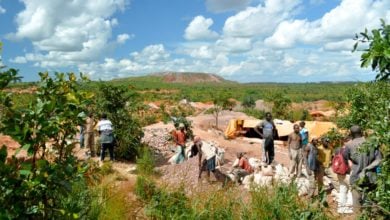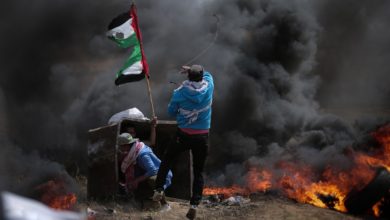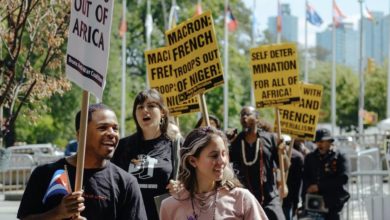Zimbabwe remains locked in a political crisis. Various rounds of negotiations since the June 27 runoff presidential election have yet to yield any sort of settlement between Robert Mugabe’s ruling party, the Zimbabwe African National Union-Patriotic Front, and the opposition Movement for Democratic Change, led by Morgan Tsvangirai.
|
Mugabe won the June runoff hands down. The MDC candidate, Morgan Tsvangirai, boycotted the runoff at the behest of his U.S. and British backers. Since then, the two sides have been engaged in heated power-sharing discussions.
On Aug. 27, one phase of the negotiations came to a head. President Mugabe pledged to form a new government, while Tsvangirai is still demanding executive authority. Forming a government includes choosing cabinet ministers and convening parliament. In the parliament, ZANU-PF controls 99 seats, the MDC has 100. A smaller MDC splinter faction led by Arthur Mutambara controls 10 seats. The remaining seat belongs to an independent.
The MDC rejected Mugabe’s move. The party aims to keep Zimbabwe’s political process in turmoil until the anti-imperialist Mugabe cedes power. The MDC’s goal is backed fully by the money and might of imperialism.
Seeking ‘regime change’
The current crisis is the result of a long period of imperialist destabilization and attempts at “regime change” in Zimbabwe.
All knives came out against Zimbabwe following the 1997 ZANU-PF decision to support and dramatically expand land seizures from the white settler minority, a serious departure from the approved neoliberal agenda for African countries. As western imperialist powers ratcheted up attacks on Mugabe, including the imposition of sanctions, the capitalist media in those countries followed suit.
Since 2000, Washington and London have hypocritically accused the Mugabe government of human rights violations and election fraud. Western powers reserve their criticism for those who seek a path independent of imperialist domination.
The U.S. and various European Union governments also did everything possible to isolate Zimbabwe economically, nurturing and working with opposition forces such as the MDC to disrupt the economy. These activities increased exponentially in the period leading up to the most recent elections, causing an acute economic and social crisis inside the country. This, combined with corruption and economic mismanagement by a number of ZANU-PF cadres, meant conditions in the country continued to spiral down.
When the imperialists aim for “regime change,” a number of tactics are on the table—economic strangulation via sanctions and market manipulation; creating and propping up “opposition” political currents; threats of assassination and military intervention; and, as in Iraq, all-out war. In Zimbabwe, their primary tools have been economic and political.
The imperialists have funded and promoted the MDC. They have tried to legitimize them through endless media coverage and by exploiting legitimate grievances held by people in Zimbabwe.
In the most recent elections, these moves set up a contentious situation in the country.
On the one hand, there is the MDC—composed of the white settler forces, western-oriented Black Africans, and a significant sector of the masses. Many poor people in Zimbabwe also have thrown their support to the MDC because of the economic troubles strangling the country.
There have been serious impediments in Zimbabwe’s post-colonial development. But these are mostly due to the drag on the economy from Western sanctions and because of the serious AIDS crisis and droughts. The two latter problems are endemic throughout southern Africa.
Any existing economic impediments have been compounded by restrictions instituted by the imperialist-run World Bank, the International Monetary Fund and the British Commonwealth of Nations. They are trying to reimpose the colonial stranglehold of the past through economic means.
It is not that the MDC would help the situation; they absolutely would not. The MDC wants to open Zimbabwe to unchecked capitalist development, worse even than the neoliberal reforms that have ravaged South Africa in the wake of apartheid. But the promise of any kind of relief when the situation is so dire has attracted some former ZANU-PF supporters.
ZANU-PF, a multi-class formation led by the bourgeois-nationalist Mugabe, still enjoys mass and militant support, particularly among war veterans. This organization led the liberation war that defeated the white settler regime. The veterans want to deepen agricultural land reform and are staunchly against neoliberal development schemes. ZANU-PF, the ruling party since Zimbabwe’s independence in 1980, also contains a significant number of government bureaucrats and crony capitalists, who only wish to enrich themselves and hypocritically use hollow rhetoric of revolution against the MDC.
Stalemate continues
The latest ZANU-PF/MDC negotiations were mediated by South African President Thabo Mbeki. Mbeki has come under serious criticism from the U.S. government and Europe, who are clamoring to get their man, Tsvangirai, in as head of state. The African states of Botswana and Zambia have recently joined this chorus, putting pressure on Mbeki and the rest of the Southern African Development Community, to do whatever is necessary to remove Mugabe from power.
SADC leaders, however, are generally wary about turning against a former African liberation leader. The SADC has resisted calls to back the MDC, but it is not immune to pressure. Mbeki has worked to resolve the crisis diplomatically. While all factions involved in the talks have agreed to form a government of “national unity,” the talks have stalled around the issue of how much power each party will have. The MDC’s Tsvangirai wants executive powers, something Mugabe is unwilling to relinquish.
It is unclear how long this crisis will continue or what forms it may take. The convening of parliament is only a formal, temporary resolution. Tsvangirai and his backers have continued to obstruct a solution; and Zimbabwe’s military and police forces, backers of Mugabe, remain hesitant. It is clear that neither side seems willing to accept anything other than controlling power in the government. The key issue for socialists is understanding what class forces each side represents.
Tsvangirai is an imperialist puppet. Although the MDC has labor union support in Zimbabwe and beyond, Tsvangirai represents the interests of imperialism and the local capitalists who would welcome the domination of foreign capital. Mugabe represents the interests of the independent national bourgeoisie and the farmers. Zimbabwe’s workers have nothing to gain and much to lose if Tsvangirai were to displace Mugabe as the country’s leader.
The unresolved status of the governmental struggle means that the crisis likely will deepen—that is, unless the imperialists get what they want. It is even possible that armed struggle could break out, in which case the MDC could call for false “humanitarian” intervention.
Anti-imperialist activists must oppose all attempts to overthrow Mugabe. He and ZANU-PF are being targeted for refusing to bow to imperialism’s dictates. The Zimbabwean people have the right to determine their own destiny without threats and intervention from hostile external or foreign-backed internal forces.
The crisis in Zimbabwe has nothing to do with “human rights” as argued ad nauseum by the imperialist press. It has everything to do with wanting to dominate an independent nation that dares to stand up for its sovereignty. Hands off Zimbabwe!





